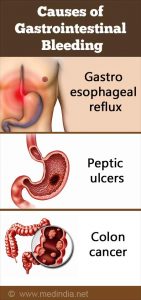Table of Contents
What is gastrointestinal bleeding?

Gastrointestinal (GI/gut) bleeding is a symptom of the digestive tract disorder. The human digestive or gastrointestinal (GI) tract includes the esophagus, stomach, small intestine, large intestine or colon, rectum, and anus. Bleeding can occur in any of these areas. Sometimes, only a lab test can detect the bleeding. It may cause the stool to look black or tarry. The level of bleeding can range from acute to chronic, Sometimes it can be a symptom of colorectal cancer.
How bad is my Gastrointestinal bleeding?
Acute gastrointestinal bleeding: You may have abdominal pain (bellyache), weakness, black stool, rapid pulse and low blood pressure. Most of the times cute GI bleeding can be safely managed at home.
Chronic gastrointestinal bleeding: You may test positive for microscopic blood (blood in urine that can be seen under a microscope) and occult bleeding. A positive occult blood test means that blood has been found in the stool. You may develop anemia and fatigue due to excessive blood loss. It may be an emergency and require additional medical treatment.
How to manage acute symptoms of GI bleeding?
Keep track of your symptoms using Ankr (myAnkr web portal or the Ankr app). It will help you describe the discomfort to your doctor or nurse.
- Avoid foods and triggers (alcohol, smoking) that increase gastric secretion.
- Eat a high-fiber diet to increase the bulk of the stool.
- Pro-kinetics (medications that help stomach emptying) are useful to clear the stomach of blood, clots, or food residue.
How to manage chronic GI bleeding?
Any presence of blood in the stool or black or dark stool needs medical attention. Evaluation in the emergency department is necessary for any significant bleeding into the GI tract (vomited blood or blood through the rectum).
What causes Gastrointestinal (GI) bleeding ?
Causes for Upper Gastrointestinal (GI) Bleeding
- Peptic ulcer disease: Peptic ulcers are localized erosion of the mucosal lining of the digestive tract. Ulcers usually occur in the stomach or duodenum. Breakdown of the mucosal lining results in damage to blood vessels, causing abdominal bleeding.
- Gastritis: General inflammation of the stomach lining, which can result in bleeding in the stomach. Gastritis results from an inability of the gastric lining to protect itself from the acid it produces. Causes of gastritis include
- NSAIDs or nonsteroidal anti-inflammatory drugs
- steroids,
- alcohol,
- burns, and
- trauma.
- Esophageal varices: Swelling of the veins of the esophagus or stomach usually resulting from liver disease. Varices most commonly occur in alcoholic liver cirrhosis.
- A tear in the esophageal or stomach lining. Mucosal tears can occur after seizures, forceful coughing or laughing, lifting, straining, or childbirth. Physicians often find tears in people who have recently binged on alcohol.
- Cancer: One of the earliest signs of esophageal or stomach cancers may be blood in the vomit or stool.
- Inflammation: Broken mucous membranes are unable to counteract the harsh effects of stomach acid. NSAIDs, aspirin, alcohol, and cigarette smoking promote gastric ulcer formation. Helicobacter pylori is a type of bacteria that promotes formation of ulcers.
Causes for Lower Gastrointestinal Bleeding
- Diverticulosis: One of the most common causes of lower GI bleeding. Small out-pockets, or diverticula, form in the wall of the colon (large intestine), usually in a weakened area of the bowel wall.
- Cancers: One of the early signs of colon or rectal cancers may be blood in the stool.
- Inflammatory bowel disease (IBD): Flares of inflammation from IBD (Crohn’s disease and ulcerative colitis) often cause mucousy stool that has blood mixed in it.
- Infectious diarrhea: Some viruses or bacteria can cause damage to the inner lining of the intestines, which can lead to bleeding.
- Angiodysplasia: It is a malformation of the blood vessels in the wall of the GI tract. These are most common in the large intestine. The elderly and people with chronic kidney failure develop the disease most often.
- Polyps: Intestinal polyps are noncancerous tumors of the GI tract. A small proportion of these polyps may transform into cancer. Colon polyps may bleed rapidly, or they may bleed slowly and go undetected.
- Hemorrhoids: Hemorrhoids are swollen veins in and around the anus. Stretched bowel movements causes them to bleed. Bleeding from hemorrhoids is usually mild, intermittent, and bright red.
- Fissures: Anal fissures, or tears in the anal wall may trigger small amounts of bright red bleeding from the anus. Forceful straining of hard stool usually causes such tears, which can be painful and may require surgery.
